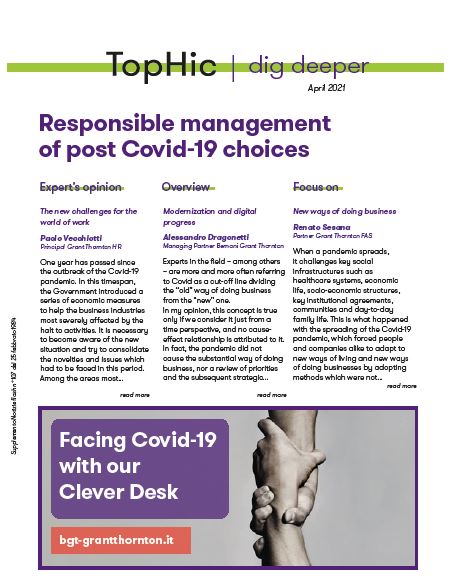-
Transactional advisory services
Find out more about the transactional advisory services of Grant Thornton Financial Advisory Services
-
Valuations
Find out more about the valuations services of Grant Thornton Financial Advisory Services
-
Mergers and acquisitions
Find out more about the merger and acquisition services of Grant Thornton Financial Advisory Services
-
Forensic and investigation services
Find out more about the forensic and investigation services of Grant Thornton Financial Advisory Services
-
Recovery & reorganisation
Find out more about the Recovery & reorganisation services of Grant Thornton Financial Advisory Services
-
Business risk services
Find out more about the business risk services of Grant Thornton Financial Advisory Services
-
Business consulting
Find out more about the business consulting services of Grant Thornton Financial Advisory Services
-
Capital market
Capital market
-
Corporate and business tax
Find out more about our corporate and business tax services.
-
Direct international tax
Find out more about our direct international tax services.
-
Global mobility services
Find out more about our global mobility services.
-
Indirect international tax
Find out more about our indirect international tax services.
-
Transfer pricing
Find out more about our transfer pricing services.
-
Litigation
Our lawyers and accountants can manage all defense measures provided not only by the Italian law, but also by EU regulations and conventions
-
Family business
Find out more about our Family business services.
-
Legal
The client can be assisted in every need and with the same care both on important operations or disputes and on simple matters

-
Back office outsourcing
Find out more about our Back office outsourcing services
-
Business process outsourcing
Find out more about our business process outsourcing services.
-
Compilation of financial statements
Find out more about our compilation of financial statements services.
-
Tax compliance
Find out more about our tax compliance services.
-
Electronic invoicing
Find out more about our electronic invoicing services
-
Electronic storage
Electronic storage is an archiving procedure that guarantees the legal validity of a digitally stored electronic document
-
Revaluation of corporate assets
Find out your civil and fiscal revaluation of tangible, intangible and financial assets
-
Payroll
Complete and customized payroll service, integrated with digital solutions and compliant with Italian and international regulations.
-
Labor consultancy
We help Italian and international companies manage all aspects of their workforce.
-
HR & Payroll Advisory Services
We review contracts, payroll, and risks for extraordinary transactions and we assess tax, labor, and safety risks in outsourcing contracts.
-
Extended services
We provide integrated digital tools to simplify HR management.
-
HR Infinity Portal
The HR Infinity Portal is Zucchetti’s platform designed to centralize communication between the company and its employees.
-
Cybersecurity
GT Digital helps clients structure information security management internal functions, also through partially or totally outsourced functions
-
Agile and Programme Management
GT Digital provides support in the adoption and implementation of different portfolio management
-
Robotic Process Automation
Our “BOT Farm” can rely on digital workers able to help clients in routine activities, allowing employees to deal with more added-value activities
-
Data strategy and management
GT Digital can support clients in seizing the opportunities offered by Big Data, from the definition of strategies to the implementation of systems
-
Enterprise Resource Planning
We support clients in selecting the most appropriate ERP System according to their specific needs, helping them also understand licensing models
-
IT strategy
GT Digital supports clients in making strategic choices, identifying innovation opportunities, comparing themselves with competitors
-
IT service management
We can support with software selection and with the implementation of dedicated tools for the management of ICT processes
-
DORA and NIS 2
The entry into force of the DORA Regulation and NIS2 represents a major step towards the creation of a harmonised regulatory framework
One year has passed since the outbreak of the Covid-19 pandemic. In this timespan, the Government introduced a series of economic measures to help the business industries most severely affected by the halt to activities. It is necessary to become aware of the new situation and try to consolidate the novelties and issues which had to be faced in this period.
Among the areas most affected by the pandemic is, first of all, the healthcare sector, followed by the economic sector and the world of work.
Remote working (commonly called “smart working” in Italy) was the main tool used to contain the spread of the pandemic. On the one hand, it allowed to keep on with the work for all those activities to which it is applicable, but on the other hand, given its forced application, its aim to guarantee employees a better work-life balance has been distorted. This led, in the medium period, to a detrimental mixture of these two factors, resulting in additional stress for employees and in a reduction in the quality of their work.
From an analysis of the experience of these months, it can be affirmed that the use of remote working has often been distorted. The working activity has been carried out mostly from home, often using inadequate devices and sharing working spaces with relatives working or studying from home as well.
A further aspect on which an organisational intervention is needed is the fact that remote working has led to a significant reduction in sharing working issues and in interaction with colleagues.
It also increased cyber security risks. Many companies have actually been forced to grant access to corporate servers to workers connected via unsecured networks or, in any case, not compliant with their security protocols.
Greater attention should also be paid to corporate welfare in order to keep into account the need to offer services, e.g. healthcare packages to employees and their family members, besides free time. Corporate welfare could play a great integration role with a significant impact in terms of advantages on labour costs, quality of work and employee engagement.
Companies which will succeed in anticipating change will surely have a vantage point in facing future challenges, since they will have turned issues into opportunities with a proactive approach, having promptly implemented choices and strategies which, if it weren’t for the pandemic, would not have been made. Many opportunities will arise, it will only be a matter of being able to seize them.
As Albert Einstein said:
“Let’s not pretend that things will change if we keep on doing the same things. A crisis can be a real blessing to any person, to any nation. For all crises bring progress. Creativity is born from anguish, just like the day is born form the dark night. It’s in crisis that inventiveness is born, as well as discoveries and big strategies.
He who overcomes crisis, overcomes himself, without getting overcome. There’s no challenge without a crisis. Without challenges, life becomes a routine, a slow agony. There’s no merit without crisis. It’s in the crisis where we can show the very best in us. Without a crisis, any wind becomes a tender touch.
To speak about a crisis is to promote it. Not to speak about it is to exalt conformism. Let’s work hard instead. Let’s stop, once and for all, with the only menacing crisis, that is the tragedy of not being willing to fight for it”.

